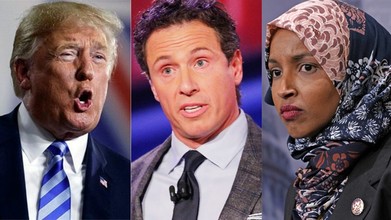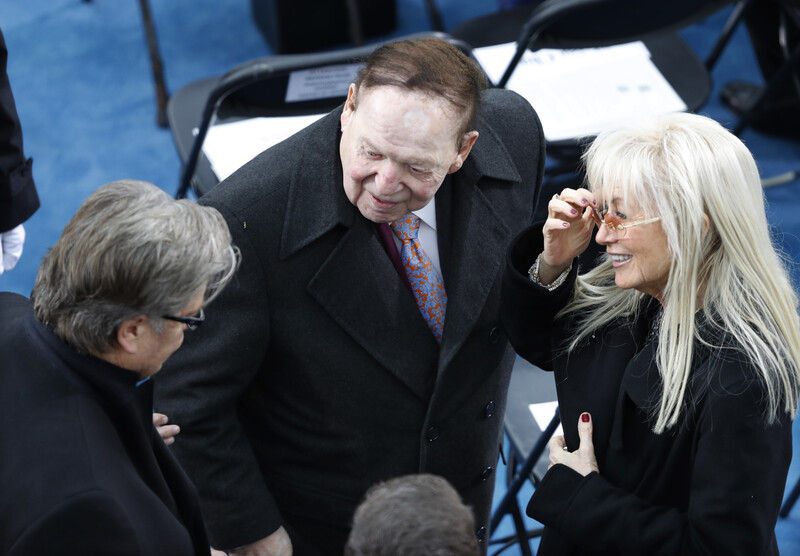Trump Condemns Oman For AIPAC Buying Republicans; After All Wasn’t Trump Bought By Sheldon Adelson?

Fox NewsFebruary 13, 2019 CNN anchor Chris Cuomo blasted President Donald Trump for his swift condemnation of Rep. Ilhan Omar, D-Minn while keeping “silent” on Rep. Steve King, R-Iowa.
ILHAN OMAR’S MOST CONTROVERSIAL MOMENTS, FROM AIPAC TWEET TO ‘NOT 1 DOLLAR FOR DHS’ CALL
On Tuesday, the president called on Omar to resign after she suggested on Twitter that Republicans who support Israel are bought by groups like AIPAC.
The Zionist-white supremacist alliance in Trump’s White House

A much-discussed article in The New York Times about pressure on President Donald Trump to fire his advisor Steve Bannon contains this intriguing sentence:
Mr. Bannon’s ability to hang on as Mr. Trump’s in-house populist is in part because of his connections to a handful of ultrarich political patrons, including Sheldon G. Adelson, the pro-Israel casino magnate who is based in Las Vegas.
As executive chairman of Breitbart News before joining the Trump campaign, Bannon transformed the right-wing outlet into what he described as the “the platform for the alt-right” – the collection of neo-Nazis, white supremacists and racists who have been the renewed focus of outrage since their violent rally in Charlottesville, Virginia, on Saturday.
Israel’s silence
Bannon is widely viewed as the champion of the white supremacists – some of whom were openly parading with Nazi flags – and the reason why Trump did not explicitly condemn them immediately after one of their number, allegedly James Alex Fields, 20, rammed his car into counterdemonstrators killing 32-year-old Heather Heyerand injuring more than a dozen others.
Hence the renewed pressure on Trump to fire Bannon. But if Bannon supports the white supremacist and clearly anti-Semitic far-right, why does he enjoy the backing of Adelson?
The Las Vegas billionaire, as is well known, is a major financier of the US Republican Party and one of the biggest donors to pro-Israel organizations in the United States. Adelson has said he regrets serving in the US army, instead of Israel’s.
He is also a close ally of Israeli Prime Minister Benjamin Netanyahu – and that’s where the answer can be found.
Israeli leaders, including Netanyahu, have been conspicuously silent about Nazis rampaging in Charlottesville – all the more strange since Israel is usually quick to exploit international events to its advantage. (After three days of silence, Netanyahu finally, on Tuesday, tweeted a general condemnation of “anti-Semitism, neo-Nazism and racism” without specifically mentioning Charlottesville.)
Why is the “Jewish state” apparently so reluctant to speak out against Nazis?
Israel’s anti-Semitic alliances
While Israel purports to be the protector of Jews all over the world, Zionists historically made alliances with the world’s most lethal anti-Semites. Zionists and anti-Semites, after all, shared the analysis that Jews do not belong in Europe, so why not cooperate to transport them somewhere else – Palestine.
This odious alliance continues in updated form, as journalist Max Blumenthal observed:
A cornerstone of Israel’s policy today is to cement ties with other ultra-nationalist, racist and Islamophobic forces around the world – even if they are also anti-Semitic.
A striking example is Netanyahu’s own embrace of Hungarian Prime Minister Viktor Orban, despite the latter’s recent praise for Viktor Horthy, the wartime ally of Hitler who oversaw the murder of 500,000 Holocaust victims.
Israel’s interests took precedence over the safety concerns of Hungarian Jews, as Netanyahu ordered his foreign ministry to tamp down criticism of Orban’s anti-Semitic dog whistles.
Notably, Richard Spencer, the neo-Nazi ideologue who wants to create an Aryan homeland in North America, has called his mission a “sort of white Zionism.” Spencer has ties to another senior White House advisor, Stephen Miller.
A similar ideological alliance prevails inside the White House. And Israel has guarded it: Ron Dermer, the Israeli ambassador in Washington, publicly defended Bannon in the days following last November’s election, after American Jewish groups strongly criticized Bannon’s appointment to a top position.
Ideology and convenience
But the Adelson-Bannon partnership is also one of convenience. The Adelson-backed Zionist Organization of America is waging a campaign against Trump’s National Security Advisor H.R. McMaster, which aims to portray the army general as “hostile to Israel.”
McMaster also happens to be one of Bannon’s key opponents inside the White House.
Establishment Israel lobby figures, such as the Obama administration’s ambassador to Israel Daniel Shapiro, have leapt to McMaster’s defense:
Choose your war
There are substantive issue at stake. Part of Bannon’s ultra-nationalist “America First” agenda is opposing some US military interventions, particularly a renewed “surge” in Afghanistan that is supported by McMaster and US defense secretary James Mattis.
That is not Adelson’s – or Netanyahu’s interest – however. Bannon and other ultra-right figures including White House advisor Sebastian Gorka – have been key opponents of the international deal with Iran over its nuclear energy program. Blocking or undermining the Iran deal has been Netanyahu’s preoccupation for years.
Bannon and Gorka furiously opposed the State Department’s recent certification that Iran is in compliance with the terms of the agreement.
The Zionist Organization of America’s key allegation against McMaster is that he is too sympathetic towards Iran.
Reporting by The Forward revealed that Gorka is a member of a Hungarian far-right group that was controlled by the Nazis during the war, and has given backing to an anti-Semitic militia.
For those who support justice and oppose war and racism, there is no “side” to choose in this battle. On one side, you have the Bannon-Adelson faction pushing extreme Zionism, anti-Semitism, white supremacy and possible war with Iran. On the other, you have have the McMaster faction, backed by the DC establishment, which wants to perpetuate America’s existing imperial wars, starting with escalation in Afghanistan.











